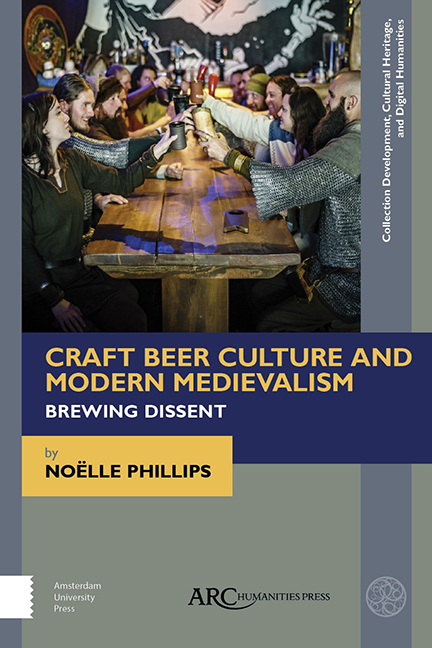Book contents
- Frontmatter
- Contents
- List of Illustrations
- Acknowledgements
- Chapter 1 Introduction: Medievalism and Craft Beer
- Chapter 2 Reading Beer in the Middle Ages
- Chapter 3 Resistance and Revolution: Craft Beer Versus Corporate Giants
- Chapter 4 Beer Heroes and Monastic Medievalism
- Chapter 5 Militant Medievalism: Norsemen, Mythology, and Masculinity
- Chapter 6 Pale Ales and White Knights: Craft Brewing, Whiteness, and Medievalism
- Chapter 7 Conclusion: The Alchemy of Alcohol
- Select Bibliography
- Index
Chapter 5 - Militant Medievalism: Norsemen, Mythology, and Masculinity
Published online by Cambridge University Press: 20 November 2020
- Frontmatter
- Contents
- List of Illustrations
- Acknowledgements
- Chapter 1 Introduction: Medievalism and Craft Beer
- Chapter 2 Reading Beer in the Middle Ages
- Chapter 3 Resistance and Revolution: Craft Beer Versus Corporate Giants
- Chapter 4 Beer Heroes and Monastic Medievalism
- Chapter 5 Militant Medievalism: Norsemen, Mythology, and Masculinity
- Chapter 6 Pale Ales and White Knights: Craft Brewing, Whiteness, and Medievalism
- Chapter 7 Conclusion: The Alchemy of Alcohol
- Select Bibliography
- Index
Summary
THE REINFORCEMENT OF masculine tropes in beer branding— and indeed, the overall gendering of beer as masculine— underlies the second major form of medievalism with which this book is concerned. I refer to this category as militant medievalism, which includes any kind of medievalism that uses aggressive, fighting figures, such as Norsemen, Celtic or Norse gods, pirates, or dragons. This medievalism, which extends the gendered implications of craft beer to their limits, draws upon Vikings, longships, gods, Valhalla, tankards of ale, fearsome creatures, outlaws, and weapons to represent achievement, strength, and masculinity. In both its sincere and parodic manifestations, militant medievalism in craft breweries is used to develop a sense of community and cultivate authenticity, just as monastic medievalism does. Norse or Viking medievalism looms the largest within this category and receives the most attention; it has a long history in North America, from films and TV shows (Vikings, Norsemen, The 13th Warrior, Erik the Viking, How to Train Your Dragon), to comics and their adaptations (Marvel Comics’ Thor, Hagar the Horrible), to kitschy costumes, to neopaganism. Since the nineteenth century, North Americans as well as the British have been fascinated by the alternate colonization narrative offered by the Vikings and their sagas. Sundmark describes the transformation in British perception of Vikings from the nineteenth through to the early twenty-first century as moving from seeing them as brutal, primitive warriors to viewing their violence as a model of heroism and bravery aligned with Englishness: “by the end of the 1950s Vikings had become accepted as part of the cultural heritage of Britain— as ‘us’ rather than ‘them.’ “ Geraldine Barnes demonstrates that, when encountering the Old Norse accounts of voyages beyond Greenland, late nineteenth-and early twentieth-century North American readers “celebrated an ideal of Viking heroism and nostalgia for the moment of discovery” while British readers inferred a sense of loss and regret that the Vikings had left their island for new lands. Similarly, Helen Dell argues that the Viking narrative offered to American readers “a less tainted genealogy” that allowed them to escape the “decayed, bloody and debauched Old World represented by Columbus.”
- Type
- Chapter
- Information
- Craft Beer Culture and Modern MedievalismBrewing Dissent, pp. 97 - 114Publisher: Amsterdam University PressPrint publication year: 2019



